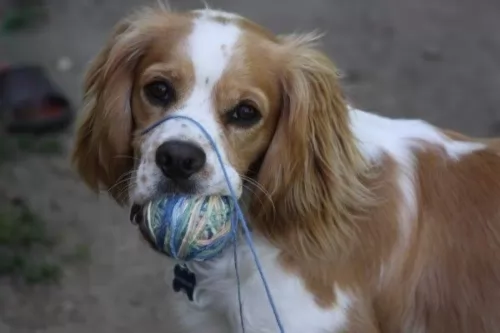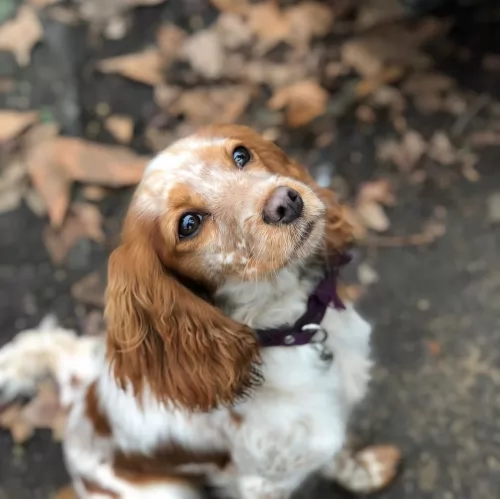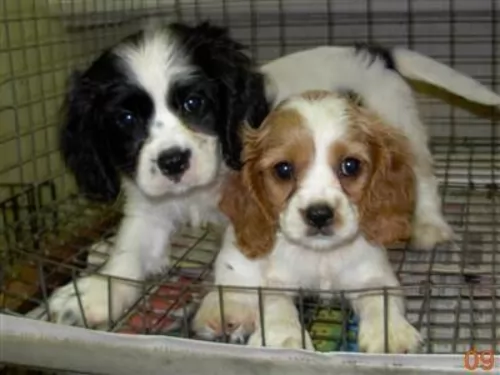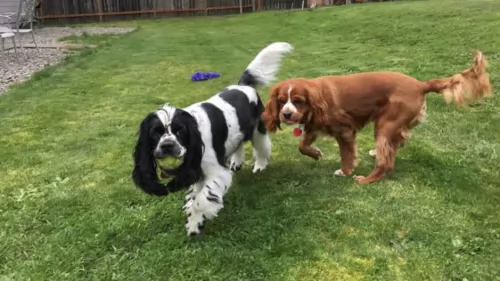 Petzlover
Petzlover Hungarian Wirehaired Vizsla is originated from Hungary but Cockalier is originated from United States. Hungarian Wirehaired Vizsla may grow 26 cm / 11 inches higher than Cockalier. Hungarian Wirehaired Vizsla may weigh 38 kg / 84 pounds more than Cockalier. Both Hungarian Wirehaired Vizsla and Cockalier has same life span. Hungarian Wirehaired Vizsla may have more litter size than Cockalier. Hungarian Wirehaired Vizsla requires Low Maintenance. But Cockalier requires Moderate Maintenance
Hungarian Wirehaired Vizsla is originated from Hungary but Cockalier is originated from United States. Hungarian Wirehaired Vizsla may grow 26 cm / 11 inches higher than Cockalier. Hungarian Wirehaired Vizsla may weigh 38 kg / 84 pounds more than Cockalier. Both Hungarian Wirehaired Vizsla and Cockalier has same life span. Hungarian Wirehaired Vizsla may have more litter size than Cockalier. Hungarian Wirehaired Vizsla requires Low Maintenance. But Cockalier requires Moderate Maintenance
 In the 1930’s some breeders noticed that the Hungarian Vizsla produced some dogs with more water, cold weather and ground cover protection because they had a much thicker coat than most of the breed. One breeder decided to cross one of these females with a German Wirehaired Pointer, thus producing the first Hungarian Wirehaired Vizsla. There were now three types of Vizsla – the smooth coated, the longhaired, and the wirehaired. The longhaired is very rare and can be either smooth or wirehaired. It is also believed based on anecdotal evidence that the original Wirehaired Vizsla was also mixed with the Bloodhound, Pudelpointer, and Irish Setter during World War II. Many kennels started breeding the Wirehaired Vizsla at this time.
In the 1930’s some breeders noticed that the Hungarian Vizsla produced some dogs with more water, cold weather and ground cover protection because they had a much thicker coat than most of the breed. One breeder decided to cross one of these females with a German Wirehaired Pointer, thus producing the first Hungarian Wirehaired Vizsla. There were now three types of Vizsla – the smooth coated, the longhaired, and the wirehaired. The longhaired is very rare and can be either smooth or wirehaired. It is also believed based on anecdotal evidence that the original Wirehaired Vizsla was also mixed with the Bloodhound, Pudelpointer, and Irish Setter during World War II. Many kennels started breeding the Wirehaired Vizsla at this time.
This rare longhaired is not recognized by any official club or organization while the smooth and the wired are recognized as two separate breeds. There are only a few longhaired Vizsla and they are only found in Europe. The Wirehaired Vizsla was recognized in 1986 by the FCI in Europe and in 2014 by the AKC (American Kennel Club).
Like their cousins the smooth Hungarian Vizsla, the wirehaired version is a natural hunter and easily trained. They are great retrievers as well as pointers in the water or on the land. Their wirehair coats offer them more protection than their smooth coated cousins. They love to swim and are very good at it and will even use your back yard pool if it is available to them.
The wirehaired Vizsla came to North America in the 1970’s and was recognized by the CKC (Canadian Kennel Club) in 1977, The North American Versatile Hunting Dog Association (NAVHDA) by 1986 and in 2006 by the United Kennel Club (UKC). The Australian Nation Kennel Council offered recognition in 2007 prior to their entrance into the AKC Foundation Stock Service. They began showing the breed at AKC events in Performance and Companionship, prior to their full AKC recognition in 2014.
These gentle hunting dogs became great family dogs as they love children and just want to be with their people. Falconers have recently taken up the breed because their temperament is suited to this work as well. There are only about 400 to 450 Wirehaired Vizslas left in the United States and few thousand across the globe.
 Known also as the Cockalier Spaniel, the Cockalier is a sweet crossbreed – a mix between the Cocker Spaniel and the Cavalier King Charles spaniel.
Known also as the Cockalier Spaniel, the Cockalier is a sweet crossbreed – a mix between the Cocker Spaniel and the Cavalier King Charles spaniel.
Both of these spaniels do have some differences. The Cockalier is a designer breed that hails from the USA. Because he is a hybrid breed the Cockalier isn’t recognized by the American Kennel Club, but as a hybrid, it is recognized by the American Canine Hybrid Club (ACHC).
 Very much like his cousins, the Wirehaired Vizsla is a noble looking breed. He is lean and muscular with a noble head and moderate skull line. Their muzzle is just a little shorter than the skull and the end is squared. They have powerful jaws and a broad, wide nostrils. The nose is brown, and the eyes are slightly darker than the dog’s coat color.
Very much like his cousins, the Wirehaired Vizsla is a noble looking breed. He is lean and muscular with a noble head and moderate skull line. Their muzzle is just a little shorter than the skull and the end is squared. They have powerful jaws and a broad, wide nostrils. The nose is brown, and the eyes are slightly darker than the dog’s coat color.
Low set ears are long and hang near the cheeks. With a strong, long neck and muscular shoulders, the Wirehaired Vizsla certainly looks the part of a hunting dog. Her chest is a little deep and the breastbone is prominent. She has round paws with short nails. Of course, her coat is wiry and dense. The undercoat is water repellent. He has an intelligent and lively facial expression.
Their ears are long but proportionate to the head and body. Their upper teeth overlap the lower teeth. Finally, the tail is thick and usually 1/3 docked. The tail is mostly carried in a horizontal position while walking or running.
 The Cockalier is a medium-sized dog standing at between 30 and 38cm in height and weighing roughly between 5 and 12kg.
The Cockalier is a medium-sized dog standing at between 30 and 38cm in height and weighing roughly between 5 and 12kg.
The coat of the Cockalier is silky and wavy. The coat is medium length and can be in colors such as golden, red, black or maybe white and brown.
The ears are fairly long and floppy, the eyes brown and expressive and the tail docked. If left, the tail is long and feathery.
The Cockalier is lively, gentle, intelligent and friendly with his human family, though he can be a little bit aloof with strangers.
He bonds very strongly with his family. They’re robust and are playful with children. They’re active dogs too and love nothing more than a hectic ball game. They don’t know when to stop and can become utterly exhausted if you don’t stop the game.
Have him trained and socialized and then he becomes even more amicable and he’s smart enough to learn basic commands without any trouble.
 Very good with children as long as he gets enough exercise.
Very good with children as long as he gets enough exercise.
Very athletic
A puppy could live in an apartment in the city, but the adult dog needs a yard and is better off on a farm.
Very smart, very responsive, high learning ability.
 The Cockalier is such a clever dog and he wants to please. He just loves his human owners, protecting them against strangers. He doesn’t take too kindly to strangers, preferring to devote all his love and loyalty to those he knows.
The Cockalier is such a clever dog and he wants to please. He just loves his human owners, protecting them against strangers. He doesn’t take too kindly to strangers, preferring to devote all his love and loyalty to those he knows.
He just craves attention and wants to be in your vicinity all the time. He is also good with children and will get on well with other pets in the home.
Once you’ve had a Cockalier in your life, you’ll want to reconsider having one of them again as they make awesome pets and companions.
 Mostly healthy but the Hungarian Wirehaired Vizsla does have some inherited dispositions to:
Mostly healthy but the Hungarian Wirehaired Vizsla does have some inherited dispositions to:
 The Cockalier is a healthy dog breed and can reach between 12 and 15 years of age. Look out for common canine health issues such as hearing loss and ear infection and vision issues.
The Cockalier is a healthy dog breed and can reach between 12 and 15 years of age. Look out for common canine health issues such as hearing loss and ear infection and vision issues.
Cockaliers that have an ear infection will shake their head and scratch their ears. The inside of the ears may be red and there may be an unpleasant smell coming from the ears. Your pet will need to see the vet.
This is a common disease with King Charles Spaniels where the mitral valve wears out and leaks and is associated with a heart murmur.
The earliest sign of a leaking mitral valve is normally a heart murmur, but it doesn’t mean heart failure is imminent, but congestive heart failure will eventuallt occur. Your dog will tire when walking, be lethargic and also have a cough. It will definitely be time to see the vet.
 Feed high quality food for medium to large breed puppies. Feed 3-4 time a day 1-2 cups.
Feed high quality food for medium to large breed puppies. Feed 3-4 time a day 1-2 cups.
Feed high quality food for adult medium to large dogs. Feed 2x a day 2-3 cups.
Great stamina and very athletic breed.
The Wirehaired Vizsla is a working dog and needs serious daily exercise. He will be full of energy and excitement if he doesn’t get enough mental and physical stimulation. He needs a family that can walk a mole or two every day or jog with him. He easily becomes neurotic and high-strung if his energy is not dissipated. Excels at Field Trials, Competitive Obedience, tracking and Barn Hunt.
 When you choose one of the commercially manufactured dog foods there are, you want to avoid those more inferior ones that have ingredients in them that can cause your dog to get sick.
When you choose one of the commercially manufactured dog foods there are, you want to avoid those more inferior ones that have ingredients in them that can cause your dog to get sick.
Look for the high-quality ones and choose the foods that have natural, wholesome ingredients in them. The vet can always help you with your decision to select a food that will of benefit to your pet.
Try to give your pet some good homemade food too such as some raw meat occasionally as well as boiled chicken, vegetables and brown rice. Fresh, cool water should be constantly available.
The Cockalier is going to require some brushing because he sheds quite a bit. Some dog owners prefer to get the Cockalier professionally trimmed. During grooming, check your pet over for any unusual lumps.
Your Cockalier will also need to have his nails trimmed, and because of the long ears, you will need to look inside the ears to ensure there is no redness and signs of infection.
Some dog owners don’t have the time or they don’t want to probe inside their pet’s ears and then a doggy-grooming-parlor can be a good idea as they do all this for you.
The Cockalier is an energetic dog, requiring a lot of exercise and games. These dogs love water games and will love you spraying him with water from the garden hose. Failing that, he’ll jump right into the swimming pool with you. Ball games are just up his street, and he will remind you every day that it’s time for his walk.